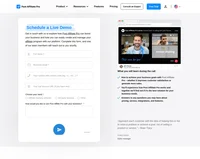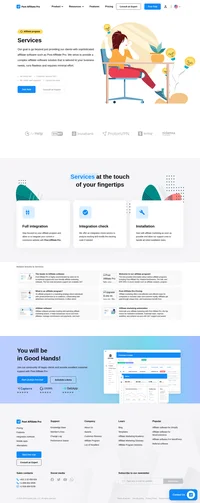What is contextual link?
Contextual link is a clickable text in the body of content on a webpage. These links can transfer visitor to another website voluntarily or they can be posted manually.
There are many pros and cons of contextual links. If they are used in a right way, they can increase traffic, awareness, site ranking and higher popularity. Then they helps with increasing sales and revenues. They can also help build a trustworthy relationship.
A contextual link is a hyperlink that is strategically embedded within the body of a webpage’s content, aligning with the topic or context of the surrounding text. These links differ from generic hyperlinks found in ads or banners because they naturally integrate into the content, providing additional value by directing readers to related and relevant information. In affiliate marketing, contextual links serve as subtle promotional tools for products or services, seamlessly blending into the user experience without causing disruption.

Importance in Search Engine Optimization (SEO)
Contextual links are a critical component of SEO strategies, serving as a significant ranking factor for search engines like Google. When placed within relevant content, these links enhance the perceived value and relevance of a webpage, benefiting both users and search engines. This relevance boosts the page’s credibility, potentially elevating its position in search engine rankings. Unlike non-contextual links, contextual links demonstrate a logical connection between the linked content and the host page, thereby enhancing the authenticity and authority of the website.
According to Vazoola, a well-placed contextual link can be more powerful than numerous random backlinks, significantly impacting a site’s authority and search ranking. Contextual links serve as indicators of the quality and relevance of your content, signaling to Google and other search engines that your site is a valuable information source.
Contextual Links in Affiliate Marketing
In affiliate marketing, contextual links are strategically placed within the content to promote affiliate products or services in a manner that appears natural and non-intrusive. For instance, a blog post about home cooking might include contextual links to kitchen gadgets, seamlessly integrating product promotion with valuable content. This approach increases the likelihood of clicks and conversions, as visitors are more receptive to links that complement the content they are engaged with.
Best Practices for Contextual Link Building
- Choose Relevant Websites: Ensure the sites you link to or receive links from are relevant to your industry or content topic. This practice increases the value of the links and enhances user experience.
- Optimize Anchor Text: Use descriptive and relevant anchor text to clearly indicate the destination of the link. Avoid over-optimization or keyword stuffing, as this can be detrimental to SEO.
- Focus on High-Quality Sites: Seek links from reputable sites with high domain authority. Links from such sites carry more weight in SEO and improve your site’s credibility.
- Create Valuable Content: Produce high-quality content that naturally attracts links from other sites. This content should be informative, engaging, and relevant to your target audience.
- Avoid Paid Links: Paid links can be risky and may lead to penalties from search engines. Focus on building organic links through genuine content and relationships.
HeyTony emphasizes the importance of choosing relevant websites and optimizing anchor text to enhance the effectiveness of contextual links. The strategic placement of these links within high-quality content is crucial for building meaningful relationships and improving site authority.
Types of Contextual Links
- External Links: These direct users to a different website, signaling the authority and relevance of your content by linking to reputable sources.
- Internal Links: These help navigate users to other pages within the same website, improving user experience and distributing page authority throughout the site.
- Natural Backlinks: Generated organically when other sites choose to link to your content due to its quality and relevance.
Loopex Digital categorizes contextual links into external, internal, and reciprocal links, emphasizing the need for relevancy to ensure the links are genuinely contextual.
Contextual Relevance in Links
Understanding and leveraging contextual relevance is crucial for the effectiveness of contextual links. This involves aligning the linked content with the context of the surrounding text at various levels:
- Domain-Level Context: Considers the thematic relationship between the linking domains.
- URL-Level Context: Focuses on the direct relevance between the specific pages being linked.
- Section and Paragraph-Level Context: Ensures the link fits logically within the section or paragraph, enhancing the user’s reading flow.
HeyTony provides a detailed overview of different contextual levels, from domain to paragraph level, highlighting the significance of maintaining relevancy at each stage to maximize the impact of contextual links.
Advantages of Contextual Links
- Improved Domain and Page Authority: Contextual links from high-quality sources can enhance your site’s authority, leading to better search rankings.
- Enhanced User Experience: By guiding users to related content, contextual links improve the overall user journey, keeping visitors engaged longer.
- Increased Referral Traffic: Quality contextual links can drive targeted traffic to your site, increasing the chance of conversions.
- Greater Brand Awareness: Being linked in relevant contexts can boost your brand’s visibility and credibility within your niche.
- Exponential Growth Potential: High-quality contextual links can lead to more links as other sites recognize and link to your valuable content.
Vazoola emphasizes that contextual backlinks are vital for improving user experience and attracting a relevant audience, thereby increasing the overall value of links.
Strategies for Acquiring Contextual Links
- Develop Link-Worthy Content: Create comprehensive, unique, and valuable content that naturally attracts links from other sites.
- Engage in Guest Posting: Write articles for other reputable sites in your industry to gain exposure and contextual backlinks.
- Leverage Broken Link Building: Identify broken links on other sites and offer your content as a replacement, thus gaining a valuable link.
- Participate in Interviews and Podcasts: These platforms often include links to your site, providing authoritative contextual backlinks.
Loopex Digital outlines effective strategies for building contextual links, focusing on creating link-worthy content and engaging in guest posting to enhance backlink profiles.

Frequently Asked Questions
Why is contextual link building important?
Contextual link building is important because it helps improve the relevancy of your site for certain keywords and phrases. When your site is more relevant for a particular keyword or phrase, it is more likely to rank higher in search engine results pages (SERPs).
How does contextual linking help in SEO?
Contextual links can be beneficial to SEO because they help search engines understand the relationship between different pieces of content on the web. Additionally, contextual links can help to increase the visibility of a website in search engine results pages (SERPs).
Discover Post Affiliate Pro's flexible pricing plans tailored to fit your business needs, with options for Pro, Ultimate, and Network packages. Enjoy a free trial with no credit card required, no setup fees, and the freedom to cancel anytime. Benefit from features like unlimited affiliates, advanced reporting, customizable interfaces, and lifetime support. Save up to 20% with annual billing and take advantage of more than 220 integrations. Perfect for businesses seeking to enhance their affiliate marketing efforts. Visit now to find the ideal plan for you!
The leader in Affiliate software
Post Affiliate Pro offers a comprehensive affiliate software platform to manage multiple affiliate programs with ease. Enjoy no setup fees, 24/7 customer support, and a free 1-month trial. Ideal for small and large businesses, it features precise tracking, automated workflows, and customizable tools to boost your affiliate marketing success. Try it now and streamline your affiliate operations effortlessly!
Explore seamless integrations with Post Affiliate Pro to enhance your affiliate marketing strategies. Discover solutions for e-commerce, email marketing, payments, and more, with easy integrations for platforms like 1&1 E-Shop, 2Checkout, Abicart, and many others. Optimize your affiliate network with these powerful tools.
Effortlessly integrate your e-commerce site with Post Affiliate Pro and boost your affiliate program's success. Our expert team ensures seamless integration with your payment processor, handling technical issues along the way. Enjoy a free trial and free integration service, saving you time and maximizing your ROI. Join now and experience top-notch affiliate management with over 500 integration options.










